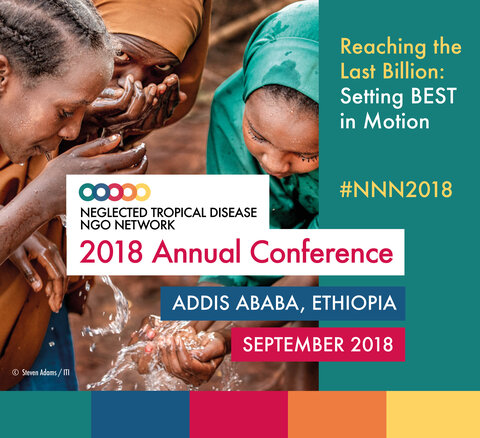9th NNN conference in Addis Ababa aims to reach the last billion affected by neglected tropical diseases

Today the 9th NNN annual conference got underway in Addis Ababa, hosted by Ethiopia’s Federal Ministry of Health (FMOH) and supported by NGO partners, to strengthen global efforts to control and eliminate Neglected Tropical Diseases (NTDs).
NTDs are treatable and preventable diseases that affect more than one billion people in endemic countries worldwide. This year’s conference theme <Reaching the Last Billion: Setting BEST in motion> will bring civil society groups together with government representatives and donors to discuss effective strategies and interventions to reach affected populations and those at risk from NTDs, to save lives.
Tanya Wood, Chair of the NNN, said: “We are delighted to be meeting in Addis Ababa this year, as our community of NGOs comes together to consider the critical challenges and opportunities to achieving a world free from NTDs.
“Being hosted by the Ethiopian Federal Ministry of Health is a great opportunity to further illustrate the importance of civil society and government working together in endemic countries to end NTDS. Ethiopia has eliminated trachoma from 35 districts just last year and stopped onchocerciasis and lymphatic filariasis multi-drug administration in six districts. We call on leaders around the world to increase their efforts to control, eliminate or eradicate NTD by 2020.”
Alongside other infections such as HIV, Tuberculosis (TB), and malaria, NTDs in Ethiopia cause serious health, social, and economic problems. According to nationwide mapping of the country’s 859 woredas: 658 are endemic for trachoma, 471 for soil transmitted helminths (STH), 417 for schistosomiasis (SCH), 201 for onchocerciasis and 70 woredas for lymphatic filariasis (LF).
In line with international targets, the FMOH has set ambitious but achievable goals to control and eliminate priority NTDs in Ethiopia by 2020. H. E. Dr. Kebede Worku, State Minster of Health, spoke at the opening session of NNN to reaffirm the importance of government commitment, leadership and ownership to control and eliminate NTDs everywhere.
The conference is being attended by approximately 500 policy makers, donors, researchers and programme staff, with a focus on sharing knowledge and lessons learned, within the BEST framework. BEST stands for Behaviour, Environment, Social inclusion, Treatment and care – and has been developed by the NNN in recognition that the health and development sectors must work hand-in-hand to play a leading role in controlling and eliminating NTDs.